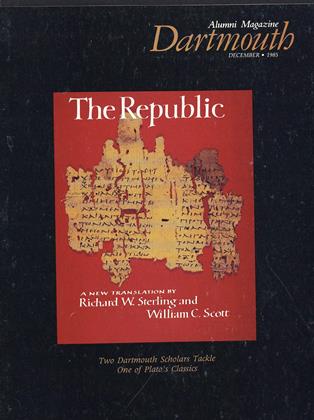Accuracy in Academia (AIA), an offshoot of the conservative Washingtonbased watchdog, Accuracy in Media, has generated considerable national press but to date little following at Dartmouth. According to AIA director Laslo Csorba III, a 1985 graduate of the University of California at Davis, the group's purpose "is to urge more balance and accuracy in the classroom."
The Chronicle of Higher Education reported the group is established at more than 110 campuses, but Csorba said he has had only "a couple of calls" from Dartmouth. AIA is trying to assemble a nationwide network of students to secretly report on factual inaccuracies and political biases of professors. The group intends to investigate charges and publish them in its monthly newsletter.
Despite Csorba's hope that student newspapers will promote AIA, The Dartmouth came out against it. An editorial stated, "An external group seeking to monitor 'accuracy' insults the students it seeks to enlighten."
The Review, however, supports AIA. Editor Roland Reynolds 'B7 said, "We would be happy to cooperate with him. He's doing the same thing we at The Review have been doing, only on a national scale."
Jeffrey Hart '51, an English professor at the College and a syndicated conservative columnist, sees no threat from AIA. "I would stand by anything I said in the classroom," he stated. "I consider any lecture a form of publication." He noted, though, that he questions the group's credibility, because of its small, relatively inexperienced staff.
Other professors however conservative as well as liberal have spoken out against AIA. Economist Colin Campbell, a political conservative, told The ValleyNews, "That's the kind of thing you have in Communist countries, with the Communist Party gathering evidence of your loyalty."
Dean of the Faculty Dwight Lahr believes "every faculty member has a responsibility ,to be accurate," so he is not basically at odds with AIA. He is concerned, however, about the potential for McCarthyistic use of the group's information.
He also feels that "AIA treats students as if they were incapable of independent thinking, and it treats colleges as if they were police states." At Dartmouth, he said, there are mechanisms to address the very abuses AIA is hunting. The Council on Academic Freedom and Responsibility is charged with enforcing an ethical code governing the faculty. If a student has a problem with bias or factual inaccuracy, Lahr's office will investigate the charge and, if it has merit, turn it over to the Council without divulging the student's name. Therefore, Lahr hopes AIA will not find a strong constituency among Dartmouth students.
Ifthelackofactivism[attoday'sDartmouth]isasignthatpeoplethinkthingsaregoingokay,andthatthey'regoingtohaveadecentfuture,thenbasicallycollegesareforlearning,notforraisinghell.Notforburningflagsandstayingoutofschoolandtakingoveradministrationbuildings.Ithinkthereoughttobealotofquestioningofsocialorderandallofthat,butbasically,collegesareforthinking."—MortonKondracke'60,NewsweekWashingtonbureauchief,intheNovember1Dartmouth
 View Full Issue
View Full Issue
More From This Issue
-
 Feature
FeatureOn the Air
December 1985 By Michael Berg '82 -
 Feature
FeatureThe Impact of Section 504
December 1985 By Nancy Wasserman '77 -
 Cover Story
Cover StoryTranslating Plato's Republic
December 1985 By Kathie Min -
 Cover Story
Cover StoryA Century of Translation
December 1985 By WILLIAM C. SCOTT -
 Cover Story
Cover StoryFragments of papyrus
December 1985 By RICHARD W. STERLING -
 Article
ArticleAstronomer Gary Wegner: Seeker of another world
December 1985 By Dave Coburn








